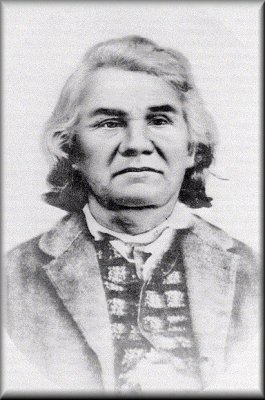 ~Stand Watie, Cherokee General of the Confederate Army~
~Stand Watie, Cherokee General of the Confederate Army~Born at Oothcaloga in the Cherokee Nation, Georgia (near present day Rome, Georgia) on Dec. 12th 1806, Stand Watie’s Cherokee name was De-ga-ta-ga, or “He Stands.” He was also known as Isaac S. Watie. He attended the Moravian Mission School at Springplace Georgia, and served as a clerk of the Cherokee Supreme Court and Speaker of the Cherokee Council prior to the removal of the Cherokees in 1838. As a member of the Ridge-Watie-Boundinot fraction of the Cherokee Nation, Watie supported removal of Cherokees to the Indian Territory (present day Oklahoma) in the West and signed the New Echota Treaty of 1835, in defiance of Chief John Ross, Watie moved with his family to Indian Territory and settled at Honey Creek. Early on during the Civil war, because he was a leader among the Pro-Southern supporters of the Cherokee mixed bloods, Watie was recruited by Albert Pike to fight for the Confederacy against the Union forces along the Western front in Indian Territory. He organized the First Cherokee (Mounted) Rifles on July 29 1861. The First Cherokee Mounted Riffles were not a Calvary Unit but rather a mounted Infantry that would ride into battle, dismount and fight on foot as Infantry from whatever cover was available. Watie was commissioned as a Colonel. On May 6th, 1864, after battling at Wilson's Creek and Pea Ridge, he was promoted to Brigadier General. Watie was the last Confederate General to lay down his arms in surrender on June 23, 1865, two months after Lee surrendered at Appomattox. Watie was the only Indian to obtain the rank of General during the Civil war. After the war, Watie served as a member of the Southern Cherokee delegation during the negotiation of the Cherokee Reconstruction Treaty of 1866. He later abandoned the public life and returned to his old home along Honey Creek. He started a tobacco business there with his family but later lost it due to back taxes. He died on September 9, 1871 ruined financially and emotionally, he was 64 years old.


4 Comments:
chuck, now this is right up my alley. I've not published it yet but I spent 2 1/2 years writing a historical fiction based around Wounded Knee. Maybe someday all will read it. But it was put on the back burner when my habits and prison changed my goals. Now, I'm working on a new book. But this is a good post and very interesting.
BTW, my (I don't know how many greats) Great Grandfather was General Jubal Early. I love civil war history, lived in Fredericksburg, Stafford, Ladysmith, Quantico, Woodbridge, Manassas and I could keep going, all in and around where fighting was done. I was in my glory and did a lot of research. But this piece you posted was very interesting and I was not at all aware of it all.I enjoyed it tremendously!
Watie is still remembered in the South. Southerners tend to consider the War of Northern Aggression as a real event, while other people look at it as history. My Great Grandfather was a Private in the 54th Georgia, fought all the way through the war, lost an eye to a Yankee cannon ball that exploded in front of his trench at Kennesaw, Ga. and then was on a hospital train that the Yankee Cavalry derailed. He broke his hip then. He was in hospital when the war ended, was paroled, and went home to Appling County, GA. He lived till 1913.
great story, around here most of the cherokees were in favor of chief john ross who thought the cheokees should remain neutral during the war, i had kin that was on both sides mainly the south, i do a little reserch from time to time but haven't come up with anything worth telling about (yet) thanks for reading.
Post a Comment
Subscribe to Post Comments [Atom]
<< Home